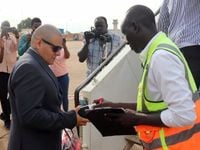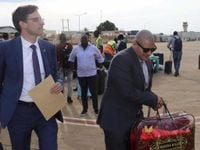At Juba International Airport, the humid air was thick with anticipation as Jesus Muñoz Gutierrez, a Mexican national deported months earlier to South Sudan by the United States, prepared to board a flight home. Surrounded by diplomats and journalists, Muñoz—one of eight men sent from the U.S. to the East African nation in July 2025—became the central figure in a saga that has drawn global scrutiny and ignited fierce debate over international migration policy, legal rights, and diplomatic responsibility.
According to CNN and corroborated by multiple international outlets, Muñoz’s ordeal began when, after completing his prison term in the United States, he was unexpectedly placed on a flight to South Sudan rather than returned to his native Mexico. “I did not plan to come to South Sudan, but during my stay here they treated me well. I finished my term in the United States, and I was supposed to be returned to Mexico. Instead, they unlawfully sent me to South Sudan,” Muñoz told reporters in Juba, echoing a sense of bewilderment and frustration. He added bluntly, “I felt kidnapped by the United States when I was sent to South Sudan.”
The circumstances surrounding his deportation are as complex as they are controversial. Muñoz was among a group of eight deportees sent to East Africa in early July. Initially, the group was moved to Djibouti, where they were housed in a Conex container converted into a makeshift military base, awaiting decisions about their final destinations. Their legal limbo was punctuated by a ruling from the U.S. Supreme Court in late June, which allowed the government to resume the practice of deporting migrants to countries other than their homelands—a move that had been previously challenged and stalled in lower courts.
The U.S. Department of Homeland Security (DHS) said Muñoz had been convicted of second-degree murder and sentenced to life in prison, a detail that has shaped much of the public and diplomatic discourse around his case. The other deportees, hailing from countries like Cuba, Laos, Myanmar, Sudan, and Vietnam, reportedly faced convictions for crimes including homicide, sexual assault, and robbery. None, except one, were citizens of South Sudan—the exception being a South Sudanese national who was released earlier.
South Sudanese officials, including Apuk Ayuel Mayen, spokesperson for the Ministry of Foreign Affairs, emphasized that Muñoz’s repatriation was conducted “in full accordance with relevant international law, bilateral agreements, and established diplomatic protocols.” At a press conference in Juba, Mayen described the departure as “soft and orderly,” and noted that Muñoz was placed under the guardianship of Mexico’s ambassador to Ethiopia, Alejandro Estivill, who traveled to South Sudan specifically to oversee the handover.
Mexico, for its part, provided assurances to South Sudan that Muñoz would not face torture, inhumane or degrading treatment, or undue prosecution upon his return. “He had been treated with full respect for his human dignity and fundamental rights during his stay in Juba,” the South Sudanese Ministry of Foreign Affairs stated, according to Reuters and AP. The process, they insisted, was a model of international cooperation, even as it unfolded against a backdrop of significant legal and ethical concerns.
Rights groups have been vocally critical of the Trump administration’s aggressive use of so-called “third-country” deportations, arguing that such practices violate international law and the basic rights of migrants. As Al Jazeera and other outlets reported, these organizations contend that sending individuals to countries where they have no ties, and where conditions may be unstable or unsafe, amounts to a shirking of responsibility by the United States. The situation in South Sudan, a nation that has faced interfaith violence and instability since gaining independence in 2011, only heightened these concerns. Lawyers for the eight men argued that their stay in South Sudan posed real dangers, though South Sudanese authorities maintained that the deportees were treated humanely and in accordance with international norms.
The legal landscape remains murky. While the Supreme Court’s June 2025 ruling allowed the U.S. government to restart swift removals of migrants to countries other than their homelands, it is not clear whether Muñoz and the other deportees had meaningful access to legal representation during their ordeal. This uncertainty has fueled further criticism from advocacy groups and prompted questions about due process and accountability.
The practice of deporting migrants to third countries is not limited to South Sudan. In recent months, other African nations—including Uganda, Eswatini, and Rwanda—have received groups of deportees from the United States. Eswatini, for instance, took in five men with criminal backgrounds in July, while Rwanda announced the arrival of seven deportees in mid-August. These arrangements, often negotiated bilaterally and sometimes shrouded in secrecy, have been touted by U.S. officials as a means of addressing the challenges of international migration and public safety. However, critics argue that they raise troubling questions about human rights, sovereignty, and the obligations of wealthy nations toward vulnerable populations.
For South Sudan, the repatriation of Muñoz was both a diplomatic challenge and an opportunity to demonstrate its commitment to international law. The country’s foreign ministry reiterated its dedication to working with partners for the safe and humane return of the six remaining third-country nationals still in its custody. “South Sudan remains committed to collaborating with international partners for the safe and humane return of six other third-country nationals currently residing in the country after being deported from the United States,” the ministry said in a statement covered by Devdiscourse.
Efforts to reach Muñoz for further comment after his departure were unsuccessful, but his experience has already become emblematic of the broader tensions and complexities facing global migration systems. The U.S. Supreme Court’s decision, the role of international diplomacy, and the lived realities of deportees like Muñoz all intertwine in a story that is far from over. As the world watches the fate of the remaining men in South Sudan—and as other countries weigh their own responses to U.S. deportation requests—the questions raised by this episode will continue to reverberate across borders and political divides.
The return of Jesus Muñoz Gutierrez to Mexico marks the end of one chapter in a deeply contentious saga, but the legal, ethical, and human dilemmas at its heart remain unresolved, promising further debate and scrutiny in the months ahead.



